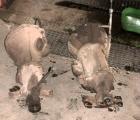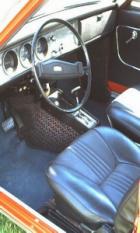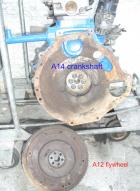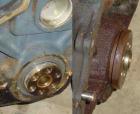Automatic-equipped cars had a significantly larger front tunnel area. The rear of the tunnel is the same. For this reason you can easily convert an Auto car to a Manual car.
Contents |
Overview
Source all the manual tranmission and clutch parts from a wrecked 1200, and the swap is easy. Trying to obtain all the parts piece by piece is a chore.
The only downside of converting your originally-automatic 1200 to a manual, you will notice that you have barely any room between the gas and brake pedals and you have to do tip-toe driving to make it work.
Also see: Automatic Transmission Overview
- Replace the auto pedals with its larger brake pedal with the standard setup that has small brake pedal and clutch pedal.
- 'Bridge' the start inhibit wires that go to the auto gearbox
- Replace the spacer in pedal box with clutch pedal (requires removal of dash and pedal box)
- Knock out the clutch firewall hole blanking plate
- In manual cars there are nuts welded from factory on the inside but autos don't. You can either put bolts and nuts thru the holes or weld some
- Install clutch cable
- Engine: remove flex plate and spacer
- add pilot bushing (if not already fitted)
- add flywheel, clutch disc and pressure plate
- Mount: either weld new mounts in or make a new crossmember
- Replace gearbox and auto tailshaft with manual versions
The speedo cable is the same.
Auto gearbox mounts are different than manual mounts, but is the shifter hole in the tunnel is in the same place (the rear portion of the tunnel is the same). Reportedly 5-speed (60-series?) fits on the automatic crossmember -- pure bolt in. If not a simple fabrication to the mount will suffice. See Gearbox Crossmember.
Shifter
Automatic shifter come with a Console.
The shifter boot will have to be used from another type of car because the automatic hole is larger than the standard shifter hole. Reportedly a boot from a 1980s Ford Escort will fit.
Driveshaft
The automatic driveshaft (Propeller Shaft) has a larger spline. Automatic vs manual lengths are also different. So obtain the M/T driveshaft. Remember that B110 and 1974 B210 driveshaft are the same, including length. The 1975-1978 B210 driveshafts have a different flange.
Note: Australian-assembled sedans use a unique tailshaft.
Rear Engine Mount
The rear engine mount, also called the "transmission crossmember" is mounted about six inches further back.
B210 and B310 have multiple crossmember mounting hole locations:

The B210 has a single set, which differs between auto and manual cars.
Part Numbers
Rubber Mount
- 11321-H1000 ASSY-INSULATOR ENGINE MOUNTING REAR Manual trans
- 11321-H1020 ASSY-INSULATOR ENGINE MOUNTING REAR Manual trans
Crossmember
- 11322-H1002 MEMBER-ENGINE MOUNTING REAR Manual
- 11322-H1020 MEMBER-ENGINE MOUNTING REAR Automatic
NOTE: B210 parts number are different from B110, but reportedly fit the same.
Engine Differences
Carburetor
For emission controls, the carb differed. However you can use any carb with an automatic.
Distributor
Auto cars had a different distributor curve for emission control. However you can use any distributor with an automatic.
Clutch Fittings
Automatic cars don't have:
- Clutch pedal
- Clutch master cylinder (LHD models)
- Clutch cable (RHD models)
These parts can be swapped from a manual car.
On the US AT models the hole for the clutch master is there but is covered up with a sheet metal cover that is spot welded in place. Takes a cold chisel, hammer, and some patience to uncover. The mounting studs need to be sourced as they are missing.
On RHD, grind off the plate where the clutch cable comes out of the fire wall and get some nuts to bolt the thing to the firewall.
Starter Motor
Starter for automatic transmission differs from starter for manual transmission. But they interchange. And both A12 & A14 starters interchange.
Flex Plate
Automatics don't use a flywheel, the torque convertor has enough mass to act as the flywheel. They use a thin "flex plate" with has the ring gear teeth for the starter.
Also note the crankshaft adapter.
You can use the flywheel off the A14 on the A15. The thing to look at is the back of your A15's crankshaft -- make sure it has the hole for the trans pilot shaft bearing.
Crankshaft
Spacer
Engine fitted with an automatic has a spacer on the end of the crankshaft that has to be removed to mate to the manual tranny.
Pilot Bearing
spigot bush/pilot bushing
Kick down Switch
Check around the top of the throttle pedal, with autos there should be either a bracket for the kick down switch,or maybe the switch is still there.
You will no longer need this switch. It can be left in place.
Tunnel
See main article: Tunnel
The automatic tunnel is designed to fit the 71-series automatic, so the smaller manual transmission fits no problem. Even large Nissan manual transmissions will fit in it - handy for an engine swap.
Cooling
Autos used:
- (optional) larger radiator. A B210 radiator is a direct bolt-in
- Radiator Shroud
- (optional) Flex fan
All are a good idea for standard or manual transmission cars.
Wiring
Automatic equipped cars have an inhibitor switch. This prevents the engine from being started unless the auto is in P or N (park or neutral). The switch is on the Automatic transmission. See Automatic_Transmission#Inhibitor_Switch.
There is a 6-terminal wiring connector on the firewall just above the rocker cover.

Leave this connected as the other wires are needed.
Down by the transmission where the harness ends is where you need to connect the wires. The starter wires are BY (black with Yellow stripe) or BR (black with Red stripe.
- Connect the two BY or BR wires together. This is for the starter
- Plug the two RB or R wires into the manual transmission Reverse Lamp switch

![[Datsun 1200 encyclopedia]](/wiki/upload/wiki.png)






